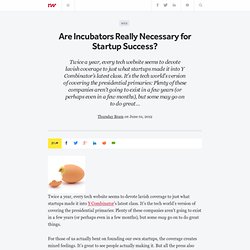

Are Incubators Really Necessary for Startup Success? Twice a year, every tech website seems to devote lavish coverage to just what startups made it into Y Combinator’s latest class.

It’s the tech world’s version of covering the presidential primaries: Plenty of these companies aren’t going to exist in a few years (or perhaps even in a few months), but some may go on to do great things. For those of us actually bent on founding our own startups, the coverage creates mixed feelings. It’s great to see people actually making it. But all the press also reinforces the feeling that every startup needs to go through an incubator in order to succeed. That can be incredibly frustrating for startup entrepreneurs.
Guest author Thursday Bram is the editor of 21times.org, a daily email newsletter for developers and entrepreneurs who want to turn their side projects into viable businesses. There Is Value in Incubators Without a doubt, an incubator can help a startup get up and off the ground quickly. The Counter-Argument Incubators: Nice to Have. Incubators matter: The average Y Combinator company is worth $45.2M. Does it matter whether your fledgling company spends a stint in an incubator?

Does it ever! Forbes‘ recent ranking of incubators around the country found that the average Y Combinator company is worth $45.2 million. Just try doing that on your own. That’s the average across 172 companies, mind you: The total value of all Y Combinator companies is $7.8 billion. “The data is of course skewed by certain large companies,” Forbes admits, among them Dropbox and Airbnb, although Mountain View, Calif.
As the article notes, Andreessen Horowitz, Yuri Milner, and Ron Conway together have provided a guarantee of $150,000 in funding for every company accepted to the prestigious club. The number-two incubator on the list is TechStars, which started in Boulder, Colo., and now has spaces in New York, Seattle, Boston, and San Antonio, Texas. “It’s become a new college for entrepreneurs because we’re so selective on front end,” said TechStars founder David Cohen, of the incubator model. Via Forbes. The dirty secret behind the incubator boom. “It’s people.

Soylent Green is made out of people. They’re making our food out of people. Next thing they’ll be breeding us like cattle for food.” Detective Thorn, Soylent Green By its very nature, entrepreneurship involves a certain amount of throwing spaghetti against a wall. Our “spaghetti” is called a minimal viable product, and we launch them because nobody really knows what’s going to stick. But while watching a recent demo day for one of the countless incubators that have sprung up in the last 18 months, I was struck by a horrifying revelation. While the decreasing cost of launching a startup has been almost universally celebrated, one of the downsides has been a flood of would-be entrepreneurs into the Internet space.
As market forces dictate, when there is an overabundance of a certain resource, the value of that resource decreases. For many incubators, entrepreneurs have reached this point. Another characteristic of markets is that value accrues to the scarcest resource.